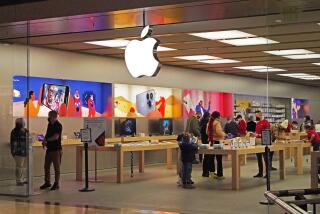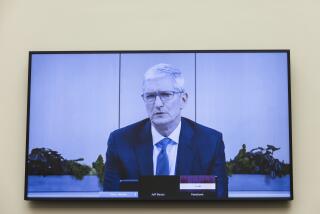Apple doubles down on idea that helping unlock iPhone would be dangerous
The struggle between Apple Inc. and federal officials over unlocking an iPhone used by one of the shooters in the San Bernardino terror attack is a legal battle, but for Apple, it’s also a battle to stay in its customers’ good graces.
The tech giant’s latest move on that front is a question-and-answer page on its website laying out its objections to a federal judge’s order issued last week that requires the company to help unlock the phone.
On the page, Apple says that it is possible to create the new operating system demanded in the court order, but that it would be “dangerous” to do so.
The Cupertino, Calif., company said this requested software would remove security features to make it easier for the government to unlock the phone through “brute force,” meaning officials could quickly try thousands of passcodes.
“It would be wrong to intentionally weaken our products with a government-ordered backdoor,” Apple said on the site. “If we lose control of our data, we put both our privacy and our safety at risk.”
Apple also objected to the court order because, it said, the order could set a legal precedent that could expand the government’s powers and possibly lead to requests for software that would enable officials to do other things, such as record conversations or track a user’s location.
But this kind of precedent would take years -- and many court decisions -- to establish, said Jim Dempsey, executive director of the UC Berkeley Center for Law and Technology.
“The government is being a little disingenuous in arguing it’s just about this one case,” he said. “I think Apple is being a little disingenuous in arguing the resolution in this particular case will decide the issues forever in all future cases.”
He said Apple would be free to argue for different outcomes in other cases before other courts if the issue moved through the appellate court system.
In a motion filed Friday seeking to compel Apple to comply with the judge’s order, federal prosecutors said they were not asking for a master key for all Apple phones, but rather software to unlock this particular phone. It said the company could keep the software and destroy it after it was used.
On the question-and-answer page, Apple said that if it created the software that the government is demanding, it would be “relentlessly attacked by hackers and cybercriminals” hoping to steal it.
“The only way to guarantee that such a powerful tool isn’t abused and doesn’t fall into the wrong hands is to never create it,” the company said.
The company also said law enforcement agents nationwide have already said they have hundreds of iPhones they will want Apple to unlock if the FBI wins this case.
Apple said it has not unlocked iPhones for law enforcement agents in the past.
The company has, however, followed court orders to extract data from devices running operating systems older than iOS 8, but Apple said it is not able to use that process with more recent operating systems.
Apple also pushed back on accusations from federal prosecutors that its refusal was “based on its concern for its business model and public brand marketing strategy.”
“Absolutely not,” the company said. “We feel strongly that if we were to do what the government has asked of us -- to create a backdoor to our products -- not only is it unlawful, but it puts the vast majority of good and law abiding citizens, who rely on iPhone to protect their most personal and important data, at risk.”
For more business news, follow @smasunaga.
More to Read
Inside the business of entertainment
The Wide Shot brings you news, analysis and insights on everything from streaming wars to production — and what it all means for the future.
You may occasionally receive promotional content from the Los Angeles Times.











